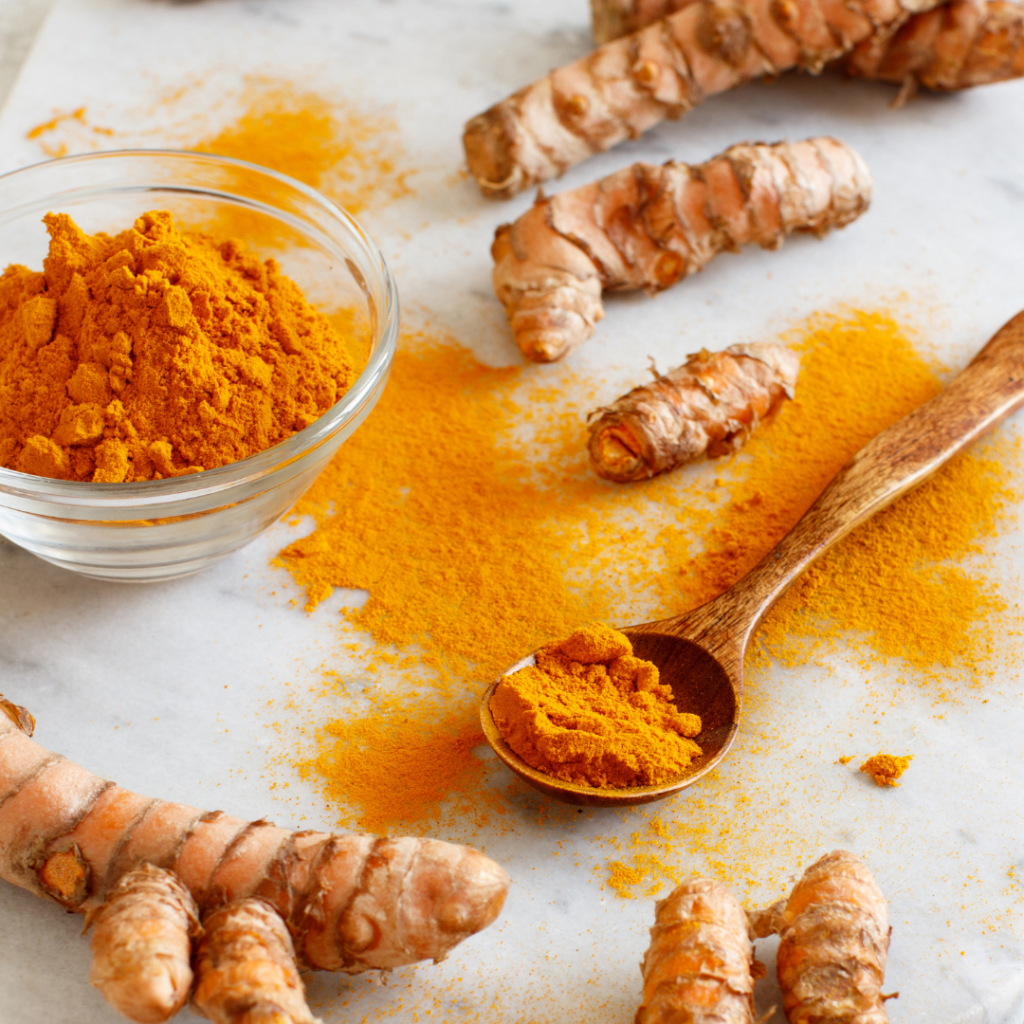Turmeric has a long history of use in Southeast Asia as a key spice in cooking, although it is becoming increasingly more popular in cuisine all over the world. It is responsible for giving the yellow color to curries in Indian cuisine as well as the yellow color in mustard. Turmeric is derived from the plant curcuma longa. Curcumin is the most active ingredient in the plant that has been shown to have anti-inflammatory benefits as well as antioxidant and anti-cancer properties.
Benefits of Turmeric
There are more than 12,000 peer reviewed studies, with emerging literature, that shows curcumin and turmeric to be beneficial in helping alleviate and decrease inflammation associated with arthritis, as well as it can help support the liver, colon and cellular health.
Helps reduce inflammation. One of the most incredible benefits of turmeric is its ability to reduce inflammation. Turmeric is a cyclooxygenase (an enzyme that produces signals that can lead to pain) 1 and 2 modulator which halt the overexpression of inflammation before it even starts to trigger pain sensation in the body.
While our bodies are well equipped for acute inflammation, chronic inflammation can become an ongoing problem. Inflammation is our bodies natural response to something that is harmful and can result in swelling, redness and pain. Once the threat is gone, the inflammatory response subsides in acute situations. However, when the response is ongoing as in the case of chronic expose to a threat, the inflammatory response continues, causing pain and discomfort. Research shows many benefits in the use of turmeric and curcumin in helping to reduce inflammation. (1)
Helps to Fight Cancer Cells. Curcumin is a polyphenol extracted from turmeric and has gained a lot of attention by scientists for its potential anticancer benefits. Studies show that curcumin can kill a wide variety of tumor cell types through diverse mechanisms (2,3). In addition, the fact that curcumin has been shown to kill only cancer cells, and not normal cells, could potentially make curcumin an attractive candidate for drug development.
May help alleviate Ulcerative Colitis. In a double-blind trial, the addition of 2-3g/day of curcumin induced remission in patients with mild to moderate Ulcerative Colitis (UC). These findings most likely due to the reported anti-inflammatory activity of curcumin. (4)
Supports oxidative damage and mitochondria. Turmeric has antioxidant properties that can benefit us in so many ways. Antioxidants are molecules that help to stabilize free radicals, which are harmful, unstable substances that can cause cellular damage. When free radicals out number antioxidants, it can lead to oxidative stress, which can cause cellular death. Damage to our cells can cause cancer, chronic disease and speed up the aging process. Another benefit of turmeric has been shown to boost our skin health by calming the pores to decrease acne and helping to reduce scarring from acne. Which is why one of my favorite products is the All Bright Vitamin C Serum from Beautycounter! Eating more fruits, vegetables and foods like turmeric can help fight against cellular damage and oxidative stress.
Cooking with Turmeric
Cooking with turmeric is easy and enjoyable. Add to rice dishes, stews, soups, eggs and vegetables. Be sure to add black pepper as well while cooking for best absorption. Below are some of my favorite ways to enjoy turmeric:
- Add to scrambled eggs or tofu scramble for breakfast.
- Enjoy a delicious golden milk latte made with turmeric, ginger and coconut milk!
- Make your own homemade curry! Try using in Instapot Butter Chicken and Apricot Curried Chicken!
- Add a dash to your homemade broths and soups for an extra punch of flavor
- Liven up your veggie dishes like cauliflower, stir-fry and rice dishes with added turmeric
- Use in a variety of sauces including this delicious Vegan Mac N’ Cheese!
Turmeric vs. Curcumin?
While cooking with turmeric is delicious and provides some health benefits, just a small amount of the active form of curcumin is actually absorbed during the cooking process. Which is why taking curcumin as a supplement and in powder form can be most beneficial to reap the medicinal benefits. It is recommended to take in dosages of 500 mg-1000 mg, up to 4 times daily for best results. For best absorption, be sure to find supplements that add in Black pepper, like Pure Encapsulations Curcumin 500 with Bioperine. Black pepper contains piperine, which can increase absorption up to 2000%! And the good news–other than allergic reactions, turmeric and curcumin are well tolerated in the recommended dosages! As always, before adding as a supplement be sure to check with your physician or health professional.
Sources:
- Jurenka et al. Anti-inflammatory properties of curcumin, a major constituent of Curcuma longa: a review of preclinical and clinical research. Altern Med Rev. 2009 Jun;14(2):141-53.
- Ravindran et al. Curcumin and Cancer Cells: How Many Ways Can Curry Kill Tumor Cells Selectively? AAPS J. 2009 Sep; 11(3): 495–510
- Giordano et al. Curcumin and Cancer. Nutrients 2019 Oct 5;11(10):2376.
- Gaby, Allen. Nutritional Medicine Second Addition. Chapter 119 pg 493.



